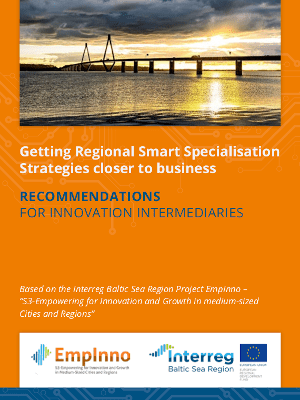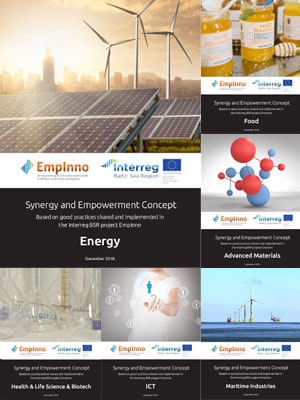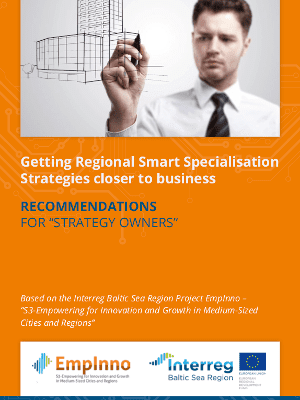EmpInno
Smart specialisation (S3) is a systematic process to make European regions globally more competitive through innovation. This approach was introduced to policy makers as well as other stakeholders from business level, academia and other innovation actors in 2011. Since then, more than 180 regional innovation strategies (RIS3) were established. Across Europe authorities face common problems and obstacles in the process of managing, delivering and monitoring their strategies.
To implement S3 is not trivial
On the one hand, public authorities (“strategy owners”) face common problems and obstacles in the process of managing, delivering and monitoring strategies for smart specialisations in their regions. On the other hand, innovation actors, such as business intermediaries, science parks, universities (as “strategy implementers”) often lack institutional capacity, resources and experiences to work with RIS3. In many regions the RIS3 are communicated insufficiently or are even unknown to the innovation actors. Compared to metropolises, medium sized cities and regions have on average a smaller critical mass for innovation and growth and the local economic actors are less outward oriented and this face similar challenges. And thus, the potential for innovation and growth remains unused.
To learn from others who face the same challenges
To face these challenges public authorities joined forces with universities, technology and science parks, business support organisations and NGOs. The authorities represented the state of Mecklenburg-Vorpommern (Germany), the region of Southern Denmark, Kujawsko-Pomorskie and Lubelskie Voivodeships (Poland), the regions Gävleborg Östergötland (Sweden), regions Satakunta, South Ostrobothnia and South Savo Finland), South-Estonia, Latvia and Lithuania. They identified six priorities they had in common in their RIS3: Information and Communication Technology, Maritime Industries, Food, Energy, Advanced Materials and Health, Life Sciences and Biotech.
Budgets
in numbers
-
2.97MillionTotal
-
2.33MillionErdf
-
0.00MillionEni + Russia
-
0.00MillionNorway
Achievements
A network to get in touch
In the course of the project a transnational network of RIS3 specialists was developed. Learning from each other on RIS3 related topics, exchanging good practices on regional innovation policy tools and gaining knowledge about ways of working with the RIS3 potential is the core of the created network. 15 representatives of public authorities from the national and regional level, universities, business support organisations, technology and science parks, non-governmental organisations signed a memorandum of understanding to secure the continuation of cooperation to enrich the capabilities of RIS3 owners and implementers to adapt new solutions to own regions and smart specialisation processes. The network is maintained with the follow up project EmpInno Monitor.
Learning from each other
To boost the cooperation between public authorities, innovation actors and companies, representatives of public authorities, universities, business support organisations, technology and science parks, and non-governmental organisations shared experiences and good practices on regional and local innovation policy instruments supporting the employment of the RIS3 instrument. As a result, various examples of boosting innovation and growth within the Baltic Sea region to better utilise the regional smart specialisation strategies and bring them closer to business were introduced, discussed and finally collected in a catalogue of "Good practices and regional innovation policy instruments".
This document offers a comprehensive overview of good practices learned during the project, as it includes the best examples chosen by the project partners in applying RIS3 in their regions. The aim of the catalogue is to provide new ideas and solutions for regional authorities and innovation actors working for RIS3 implementation to improve and update regional policy tools and organisational set-up.
Improving RIS3 in the different regions
The partners established a closer cooperation between RIS3 owners and implementers, e.g. Rostock Business and Technology Development GmbH (DE) as RIS3 implementer in Mecklenburg-Vorpommern, should be stronger involved in the process of RIS3 development and update, especially when it comes to methods of monitoring results of the RIS3 implementation in the region. Östergötland County Council (SE) continued to develop the model of RIS3 specialists and ambassadors and also introduced new supporting measures and tools for this work that were developed within EmpInno, e.g. organisational couching tools or RIS3 feedback papers. In the Region Gävleborg the initiative with "the smart specialisation school" was continued to further enhance the RIS3 capacity in the regional innovation support system.
Outputs
RIS3 recommendation for innovation intermediaries

Synergy and Empowerment Concepts for energy, food, health and life science, ICT, maritime industries and advanced materials

RIS3 recommendations for strategy owners

Project Stories
Partners
Rostock Business and Technology Development GmbH
- TownRostock
- RegionRostock, Kreisfreie Stadt
- CountryGermany
- RepresentativeGert Proba
- Phone
- E-Mail
- Web
South Denmark European Office
- TownEsbjerg
- RegionSydjylland
- CountryDenmark
- RepresentativeThomas Jensen
- Phone
- E-Mail
- Web
Kujawsko-Pomorskie Voivodeship
- TownToruń
- RegionBydgosko-Toruński
- CountryPoland
- RepresentativeRafał Modrzewski
- Phone
- E-Mail
- Web
Lubelskie Voivodeship
- TownLublin
- RegionLubelski
- CountryPoland
- RepresentativeAnna Kępa
- Phone
- E-Mail
- Web
Foundation for Lubelskie Development
- TownLublin
- RegionLubelski
- CountryPoland
- RepresentativeMałgorzata Gałczyńska
- Phone
- E-Mail
- Web
Kaunas Science and Technology Park
- TownKaunas
- RegionKauno apskritis
- CountryLithuania
- RepresentativeTomas Černevičius
- Phone
- E-Mail
- Web
Riga Planning Region
- TownRiga
- RegionRīga
- CountryLatvia
- RepresentativeDace Grīnberga
- Phone
- E-Mail
- Web
Tartu Science Park Foundation
- TownTartu
- RegionLõuna-Eesti
- CountryEstonia
- RepresentativeVaido Mikheim
- Phone
- E-Mail
- Web
Tartu City Government
- TownTartu
- RegionLõuna-Eesti
- CountryEstonia
- RepresentativeKaili Ojamets
- Phone
- E-Mail
- Web
Prizztech Ltd
- TownPori
- RegionSatakunta
- CountryFinland
- RepresentativeMarko Lehtimäki
- Phone
- E-Mail
- Web
Regional Council of South Ostrobothnia
- TownSeinäjoki
- RegionEtelä-Pohjanmaa
- CountryFinland
- RepresentativeJaakko Hallila
- Phone
- E-Mail
- Web
Östergötland County Council/Region Östergötland
- TownLinköping
- RegionÖstergötlands län
- CountrySweden
- RepresentativePeter Larsson
- Phone
- E-Mail
- Web
Gävleborg County Council
- TownGävle
- RegionGävleborgs län
- CountrySweden
- RepresentativeCarina Akerberg
- Phone
- E-Mail
- Web
D2i – Design to innovate
- TownKolding
- RegionSydjylland
- CountryDenmark
- RepresentativeLeendert Bjerg
- Phone
- E-Mail
- Web
South-Eastern Finland University of Applied Sciences - XAMK
- TownMIKKELI
- RegionEtelä-Savo
- CountryFinland
- RepresentativeNatalia Narits
- Phone
- E-Mail
- Web
-
Project managerGert ProbaRostock Business
-
Legal representativeChristian WeissRostock Business and Technology Development GmbH
-
Financial managerLars SchieberREM Consult
-
Communication managerLars SchieberREM Consult



